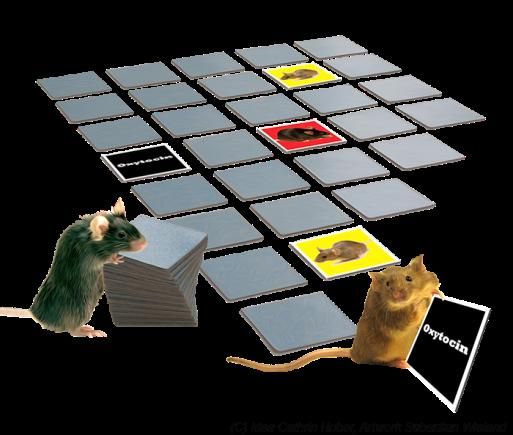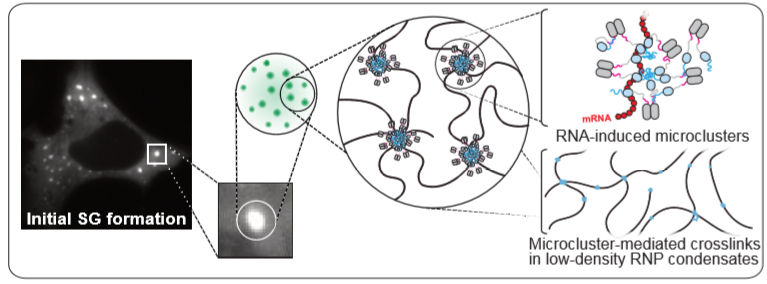Oxytocin sharpens the senses
Social recognition requires the perception of relevant social cues and the identity of others to elicit proper responses. Problems in the early perception of social information will impact consequently subsequent stages of information processing and eventual social responses. Hans Asperger, a pediatrician after whom one form of autism is named, had already highlighted altered sensory perception as a hallmark of the disorder. These alterations in sensory processing have gained progressively more attention in the last few years and are now also added to the latest revision of the American diagnostic research criteria.
Neuronal processing underlying social interaction can be affected at different levels. The neuropeptide oxytocin has turned out to be a key modulator in the perception of others as research groups at the Central Institute had shown in the last years. Oxytocin is tested in many studies for instance to support psychotherapy trying to alleviate deficits in the recognition of interpersonal interactions. The mechanisms have however not been entirely clarified how Oxytocin modifies the perception of social cues.
Scientists around the Neurobiologist Lennart Oettl and the Psychiatrist and Neurophysiologist Dr. Wolfgang Kelsch (Department of Psychiatry and Psychotherapy, Head of the Research Group of Developmental Biology of Psychiatric Disorders) now revealed a mechanism in mice how Oxytocin can modulate the perception and later recognition of other individuals. Just like most animals, mice use primarily olfactory cues for social recognition. The scientists found that Oxytocin released from the brain improves the signal-to-noise in sensory information processing. Oxytocin activates so-called top-down projections from the cortex down to sensory networks where the top-down inputs drive inhibitory neurons. This top-down drive of inhibition improves signal quality in the sense of attentional filtering. The modified sensory information is then propagated to higher cortical areas. Through this mechanism, Oxytocin modifies the processing of social cues and improves later recognition of other individuals.
„It is a little bit like playing the game memory where you have to sharpen your senses on distinguish similar objects and later remember them when they appear again. Oxytocin seems to promote these two aspects in social recognition“, explains Wolfgang Kelsch. This means that Oxytocin sets the sensory processing network in a particular state for the efficient processing of social cues. Oxytocin acts at multiple levels of the processing of social cues. The present finding highlights that Oxytocin’s actions early in the information stream will impact downstream processes. The here described mechanisms could also apply to psychiatric disorders and explain some of the altered perception observed with autism, and, as recent studies in humans show, potentially serve as a starting point for more objective diagnostic criteria.

Social recognition in rodents bears similarities to the "Memory Game"
Idea Cathrin Huber, Artwork Sebastian Wieland
Original publication
Lars-Lennart Oettl, Namasivayam Ravi, Miriam Schneider, Max F. Scheller, Peggy Schneider, Mariela Mitre, Miriam da Silva Gouveia, Robert C. Froemke, Moses V. Chao, W. Scott Young, Andreas Meyer-Lindenberg, Valery Grinevich, Roman Shusterman, Wolfgang Kelsch; "Oxytocin Enhances Social Recognition by Modulating Cortical Control of Early Olfactory Processing"; Neuron; 2016
Original publication
Lars-Lennart Oettl, Namasivayam Ravi, Miriam Schneider, Max F. Scheller, Peggy Schneider, Mariela Mitre, Miriam da Silva Gouveia, Robert C. Froemke, Moses V. Chao, W. Scott Young, Andreas Meyer-Lindenberg, Valery Grinevich, Roman Shusterman, Wolfgang Kelsch; "Oxytocin Enhances Social Recognition by Modulating Cortical Control of Early Olfactory Processing"; Neuron; 2016
Organizations
Other news from the department science

Get the life science industry in your inbox
By submitting this form you agree that LUMITOS AG will send you the newsletter(s) selected above by email. Your data will not be passed on to third parties. Your data will be stored and processed in accordance with our data protection regulations. LUMITOS may contact you by email for the purpose of advertising or market and opinion surveys. You can revoke your consent at any time without giving reasons to LUMITOS AG, Ernst-Augustin-Str. 2, 12489 Berlin, Germany or by e-mail at revoke@lumitos.com with effect for the future. In addition, each email contains a link to unsubscribe from the corresponding newsletter.
More news from our other portals
Last viewed contents
Phylogica and Isogenica: Strategic alliance fast tracking screening of drug discovery targets

How do our cells respond to stress? - Molecular biologists reverse-engineer a complex cellular structure that is associated with neurodegenerative diseases such as ALS
Affitech signs license agreement for single-chain antibody technology with Micromet

99 million people included in largest global COVID-19 vaccine safety study - Global Vaccine Data Network utilises vast data sets to detect potential vaccine safety signals
Affibody AB provides novel molecular imaging agents for visualizing HER2-expressing cancer
BTG signs agreement with Novacea and KuDOS for AQ4N
To-BBB awarded EUR 1.25 million European FP7 funding to develop treatments for inherited retinal diseases
Galapagos enters into discovery collaboration with Idenix for infectious disease programs
Bayer and Ortho-McNeil, Inc. Outline Phase III Study Program of Oral Factor Xa Inhibitor Rivaroxaban in Chronic Indications - Patient Recruitment for Phase III Clinical Trial to Start in Studies of Oral Anticoagulant in Chronic Indications
AnaSpec and UW TechTransfer Sign Licensing Agreement for Protein Tyrosine Phosphatases



















































